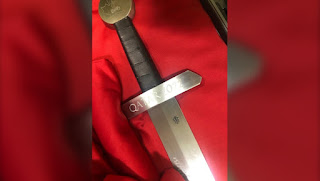Canadian Prime Minister Justin Trudeau addressed the European Parliament yesterday and although his reception was generally polite, two or three MEPs indulged in some pretty vitriolic criticisms, mainly around his responses to the so-called "Freedom Convoy" protests.
Mislav Kolakušić, an independent MEP from Croatia who has previously been penalized by the European Parliament for his anti--vaccine stance, tweeted, "in recent months, under your quasi-liberal boot, Canada has become a symbol of civil rights violations. The methods we have witnessed may be liberal to you, but to many citizens around the world it seemed like a dictatorship of the worst kind". Kolakušić elaborated, "We watched how you trample women with horses, how you block bank accounts of single parents so they can't even pay their children's education and medicine".
Not to be outdone, far-right German MEP Christine Anderson (who was also on that list of MEPs chastised for anti-vaxx activities) joined in, "A Prime Minister who openly admires the Chinese basic dictatorship, who tramples on fundamental rights by persecuting and criminalizing his own citizens as terrorists just because they dared to stand up to his perverted concept of democracy should not be allowed to speak in this house at all".
Fellow Alternative for Germany MEP Bernhart Zimniok made his own contribution to European democratic debate and rhetoric, claiming that Trudeau has been, "cracking down on people who protested against disproportionate corona measures, people who were supporting a non-sanctioned movement coming under criticism", and "clearly the values of democracy are being despised by this individual. Let us not give someone like this any speaking time in this house of democracy".
Romanian right-winger and ex-priest Christian Teresa (yes, also on that list) refused to even attend the meeting at which Trudeau was due to speak, so outraged was he, spitting at Trudeau, "you trample with horses' hooves your own citizens who are demanding that their fundamental rights be respected".
Well, where to start? This is a fascinating if rather depressing, glimpse into right-wing European politics, and it seems the tone is no more elevated there than here in North America. I think the MEPs may have been getting their news reports from Fox News or the Toronto Sun, or some other less-than-reputable outfit.
For one thing, Trudeau was not integrally involved in the policing of the scabious protesters; it was essentially an Ottawa Police Service and Ontario Provincial Police operation, with some help from the RCMP. I did not see Trudeau out there on horseback and in riot gear at any point.
Be that as it may, branding Trudeau as a "dictator" at a time when the European Parliament was debating Vladimir Putin is a little rich. The whole thing about Trudeau personally trampling poor defenceless women comes as a bit of a shock, it not having hardly been reported here. I assume they are referring to Fox News reports of police officers on horseback injuring or possibly killing a female protester at the occupation, reports that have been roundly dismissed as inaccurate. Video footage of an injured woman did surface, but she certainly did not die (she herself said that she was "hurting but OK"), and it is far from clear that she her injury arose due to the police horses (still less Trudeau!) The Fox News tweet continued to reproduce around the world regardless, and in spite of subsequent retractions by the originator.
Blocking bank accounts of poor single mothers? They are presumably referring to the case of one Briane, a single mother (odd detail, that) who donated $50 to the Freedom Convoy campaign. This was a case publicized by BC MP Mark Strahl, and appears to have been spurious (or at least the part about her bank account being blocked). Only the occupation's leaders and truckers actively illegally blocking the streets of Ottawa were targeted by this Emergencies Act legislation, not individual donors. Makes a good story, though (until it doesn't).
Hmm. What else? Oh, yes, Justin Trudeau admiring the Chinese dictatorship. Where did that come from? "There is no question that there have been tremendous human rights abuses reported coming out Xinjiang, and we are extremely concerned with that". No, not that one. "We have real concerns about China's behaviour in regards to human rights". No, not that one either. How about: "We will remain absolutely committed to working with our allies to ensure that China's approach of coercive diplomacy, its arbitrary detention of two Canadian citizens, alongside other citizens of other countries around the world, is not viewed as a successful tactic by them." No, probably not.
No, they are referring to a single 2013 interview in which a pre-Prime Ministerial Trudeau expressed admiration for the way in which China could pivot so quickly to take up issues like green investment. The comment was flippant and ill-advised, and was pounced upon by opposition politicians, even if it was taken slightly out of context (and the second part of his answer was overlooked completely). The bottom line, though: Trudeau is not a big supporter of Xi Jinping.
So, European right-wing demagoguery: pretty similar to North American right-wing demagoguery. Heavy on ad hominen smears, light on facts. I think what they were trying for, in a rather inept way, was to criticize Trudeau's use of the Emergencies Act to help bring an end to weeks of illicit (and, as is increasingly apparent, downright criminal) occupation of Canada's capital by self-styled Canadian freedom fighters without causing unnecessary bloodshed. Many right-wing commentators have panned the move as anti-democratic and heavy-handed, even though it was actually hardly used in the end. The measure, which, incidentally, was passed by a majority vote in Parliament and not on a whim of the Prime Minister, attracted a court challenge by the Canadian Civil Liberties Association (oh, and by Alberta Premier Jason Kenney because, well, why not?), although nothing has come of the challenges so far.
